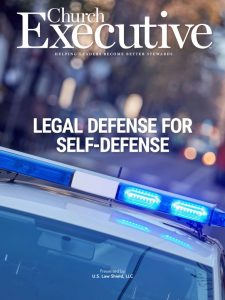
By Kirk Evans
We live in trying times, in an era when hatred sometimes boils over into violence against strangers.
What was once your safe place — your church sanctuary — is not immune to violent attacks.
Criminals can come into your service, armed with intent to murder. To protect what is sacred, you must maintain a higher level of situational awareness. You and your safety team cannot afford to miss or ignore even the smallest details; the consequences for unpreparedness can be severe.

A large part of being prepared and building situational awareness involves training. There is a saying that “you don’t rise to the occasion; you sink to the level of your training.” This truth is played out daily in the military. When you hear about the heroics of Navy SEALs or Army Rangers, you’re really hearing about the results of their training. These soldiers were not counting on chance or luck; on the contrary, in their hour of testing they drew upon the skills they had acquired during training.
This principle is also true when it comes to the duties and responsibilities of a house of worship safety team. The failure to train increases the likelihood of a successful attack. Consider the story of Jack Wilson. You’ve probably seen the surveillance video of Jack pulling his gun and shooting a man who had just killed two of his fellow churchgoers. He was able to do that in less than a second, but it wasn’t due to “luck.” Jack’s response at that Sunday morning worship service was the product of more than 40 years of firearms training.
First things first
Of course, there are legalities to consider before deciding if a safety team is in order. If the attack is foreseeable, the place of worship might be held liable for not taking steps to prevent it.
Conversely, if an “employee” of the church is negligent and harms an innocent, the church might be held responsible for not training the employee properly.
There are many issues that need to be considered before constructing a safety team, and there is no blanket rule that will fit every occasion.
If you use volunteers, it is best to remove the word “security” from your lexicon entirely. Steer toward labels such as “safety team” or “sanctuary watch team” to be sure you do not unintentionally violate the law.
Thankfully, places of worship have options. The law allows a church to hire professional security services or take advantage of voluntary security services, although this will vary by state. For example, while places of worship may employ security services from law enforcement officers or people who have a private security license, Texas Occupations Code Section 1702.333 exempts the security permit requirement for “volunteer security services” individuals. Keep in mind, a “volunteer” is not paid and cannot hold themselves out as a security or law enforcement officer. If you use volunteers, it is best to remove the word “security” from your lexicon entirely. Steer toward labels such as “safety team” or “sanctuary watch team” to be sure you do not unintentionally violate the law.
Alternatively, a simple approach to staying legal and avoiding church liability can be something as passive as allowing law-abiding citizens with firearm experience to carry in church under no formal name or guidance. Liability often exists when training, oversight, and control are exerted over the volunteers by the church.
At U.S. LawShield®, many of our employees are involved in activities at local houses of worship. We have a vested interest in this matter and are hopeful that our church leaders are taking the necessary steps to create the safest environment possible.
We offer safety team training to houses of worship and faith-based organizations across the country, where we address topics such as:
• How to put together a safety team;
• Where to station your team;
• Protecting the children;
• Stopping an armed intruder;
• Laws governing the use of force;
• and so much more.
For more information on having us come to your area and conduct such a training session, email Howsafe@uslawshield.com.
It might seem like a daunting task to form a church safety team that is properly trained while avoiding any potential legal pitfalls, but it doesn’t have to be. It is well worth the time and effort to educate yourself on liability and risks when securing your church and family.
Kirk Evans is the president of U.S. LawShield, a national legal defense program with more than 700,000 members. Evans has practiced law in Texas for more than 25 years and concentrated most of his work on complex civil litigation and constitutional issues. He has provided legal guidance for church leaders and safety teams as well as represented gun owners, instructors, ranges, and law enforcement, and has written several firearms legal publications, including Texas Gun Law: Armed and Educated.
U.S. LawShield® is a Legal Defense for Self Defense® Program, not a law firm. Membership in the U.S. LawShield Legal Defense for Self Defense Program is not a guarantee of any particular outcome. All legal services are provided by independent third-party program attorneys who are part of the Program. Visit www.uslawshield.com for terms, conditions, restrictions, and insurance licensing information.


